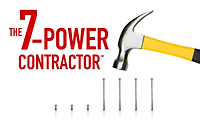Keeping commercial customers
A commercial sales agent is the person at your company who is dedicated to creating relationships.

A commercial sales agent is the person at your company who is dedicated to creating relationships with new commercial customers and keeping current commercial customers happy with what you provide.
The sole purpose of CSAs is to create more sales opportunities for other people at your company — commercial installation work, preventative maintenance work and service work.
They’re in the best position to strengthen and maintain healthy business relationships with the commercial businesses you already service.
They are notthe salespeople at your company who sell equipment and have extensive training on what it takes to do that specialized work. I’ll share more about why that is later on.
For now, think drug company rep who comes to visit the doctor’s office hoping to bring donuts and talk up the people at the desk in order to see the decision maker.
The reason you need this position at your company is because it’s easy to neglect your commercial accounts because you and your people are busy with other things. Face it. You already know you’ve lost touch with commercial customers you serve, the very people you once showered with attention when you first opened up the account.
You need a “belly-to-belly salesperson” to keep the love flowing between the customer and your company. Remember, if you’re not whispering sweet nothings in their ear, someone else will be.
Sometimes we get so busy trying to grow our commercial business that we mistakenly think these customers must be happy with us, and we don’t need to divert our time and energy to them anymore. The mistake is thinking that if they’re not calling to complain, they must be happy with you. That’s not necessarily so. Many times these customers feel they’ve been believe and are just beginning to look around for someone else to serve their needs.
So when a good salesperson from your competition shows up to talk to these unhappy customers about their accounts, they will be able to exploit the neglect and unhappiness. Or sometimes your customer goes shopping at a convention or trade show. Any way it happens, you won’t find out until they’re gone, and then it’s too late.
The only way to minimize this scenario is by becoming proactive about building and maintaining strong relationships based on a combination of face time and good ongoing communications.
Building new commercial business and maintaining these highly personal relationships is time-intensive and takes great customer skills.
Here’s where I share with you why your equipment salesperson will not make time to do this work. He will spend his time on whatever he believes will give him the biggest bang for the buck. In other words, he will do whatever type of work he likes to do best, whatever he can do in the shortest amount of time with the least amount of effort that will make him the most money right now.
That’s why developing a commercial sales agent at your company is so important.
Here are just a few things you want your new CSA to do:
-
Find new commercial clients that result in new business. This should create commercial service and install work opportunities for the company.
-
Work with the sales manager to create new marketing initiatives and make sure the agreed-upon marketing initiatives are being executed to company standards so the goal of new commercial work is being reached.
-
Dedicate the time and energy to keep existing commercial clients using your company, as well as keeping the CSA’s own newly opened accounts using your company. The reason to keep up the good relationships is the CSA continues to get paid when this account continues to use the company.
-
Improve the CSA’s measured performance through software tracking and a paperwork process that allows the company to track and reward appropriately.
-
Handle customer complaints from the CSA’s accounts by tracking them and reporting resolutions to the sales manager.
-
Be accountable to goals for opened accounts and dollars produced both from new accounts and existing accounts served.
Processes and procedures
What’s really helpful is to have a documented sales process for your commercial sales agent to follow.
The general sales call procedure needs to start before the CSA even leaves the shop. All the necessary customer background and contact information should be obtained from the customer service representative. The CSA is required to verify the appointment and contact information before making a field visit.
If the CSA is running cold leads (which is part of the job) to reach potential clients through all types of methods such as calling, stopping into their office, emailing and meeting them at trade shows and conventions, they are the ones responsible for lead generation and tracking without the CSR in the office being involved.
Make sure the CSA:
-
Arrives within the time range promised. If running late, call to keep the business owner updated. And if the delay has made it inconvenient for him, reschedule at a convenient time for the business contact.
-
Dresses appropriately as described in the Commercial Sales Agent Manual in order to make a good first impression.
-
Begins the meeting by asking the customer what the problems are in the building and what he wants to achieve. This is how the CSA can help develop trust with the customer.
The CSA should ask these three questions and write down the customer’s answers:
-
What is the most disruptive issue when the plumbing, heating or cooling system isn’t working?
-
What’s been your frustration with service in the past?
-
How important is it to avoid these type of issues before they have an impact?
This will get you off to a good start toward building a commercial sales agent at your company. It’s the very best way I know to get more new commercial accounts while keeping the commercial accounts you already have happy and buying more of the products and services your company sells.
Looking for a reprint of this article?
From high-res PDFs to custom plaques, order your copy today!









